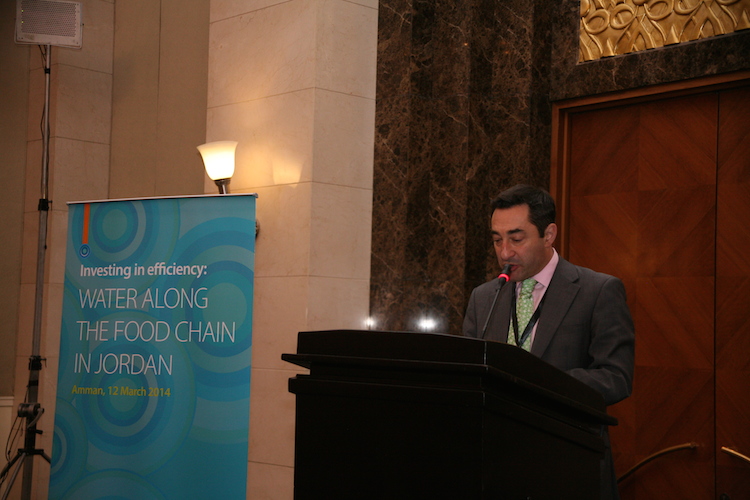Stimulating the flow of investment for enhanced water productivity in Jordan

EBRD and FAO Investment Centre bring together public and private sector to identify bottlenecks and opportunities
Investments in Jordan’s agriculture sector should target profitable food chains that have made clear efforts to improve their water efficiency and that have the potential to further enhance the productivity of the water they consume, a high-level forum in Amman heard today.
The initial findings of a new FAO report, Water Along the Food Chain: The Jordan Case, were presented to policy-makers, international organisations and investors at the forum organized by the Food and Agriculture Organization of the United Nations (FAO) Investment Centre and the European Bank for Reconstruction and Development (EBRD) in collaboration with Jordan’s Ministry of Agriculture.
Although water use by Jordan’s food and agriculture sector, which accounts for around 60 percent of total water use in the country, is in line with worldwide consumption levels, the country has one of the world’s largest water deficits, creating a chronic imbalance between resource availability and use, the forum heard.
The FAO report examines two of the country’s most economically important food chains: irrigation-dependent winter vegetables and fruits from the Jordan valley, which are the country's main agricultural exports, and the processed meat value chain, in particular the rapidly developing poultry industry.
“Both value chains have already achieved relatively high water efficiency, yet water productivity and overall competitiveness can be improved,” explained Turi Fileccia, Senior Agronomist at FAO and main author of the report.
“Investment is required to further develop the most profitable segment of the domestic poultry meat industry and to expand the growing area of the Jordan Valley to produce fruits and vegetables that target high-end export markets. ”
Investing in efficiency
Improving water efficiency and productivity, identifying key points for investment, and boosting coordination between the public and private sectors are critical for the sustainable development of the country’s agriculture sector, the forum heard.
"It is important for the public and private sector to share their distinct points of view so we can identify the key bottlenecks, understand why there is not more investment in water productivity, and target EBRD investments accordingly," said Heike Harmgart, Head of the EBRD Office in Jordan.
The EBRD has carried out a targeted analysis in the agribusiness sector, prompted by concerns about rising food prices and food insecurity, coupled with increasing water scarcity, climate change and the high proportion of water used in agriculture. The Bank analysed options for the private sector to contribute to water- and resource-efficient food production through enhanced technology. The aim is to improve water productivity, overall sector competitiveness and to promote sound water policies.
In Jordan, specific dimensions need to be addressed when tackling water scarcity in the agribusiness sector, the forum heard.
These include developing appropriate pricing schemes, improving the efficiency of irrigation systems and increasing the availability of alternative sources such as treated waste water. It is also vital to develop water storage, and reduce wastage of agricultural water – both upstream and downstream – in food production.
The forum, entitled Investing in efficiency: Water along the food chain in Jordan, was organised with funding from the EBRD’s southern and eastern Mediterranean (SEMED) Multi-Donor Account (MDA). Donors to the SEMED MDA include Australia, Finland, France, Germany, Italy, the Netherlands, Norway, Sweden and the United Kingdom.
